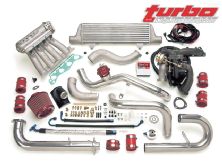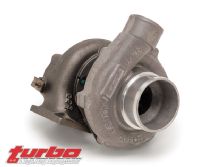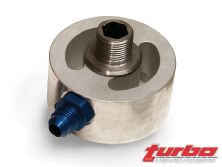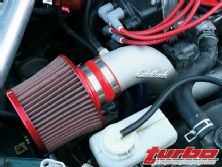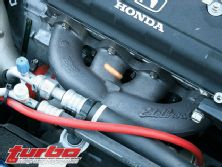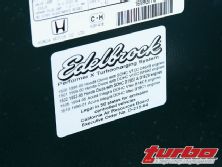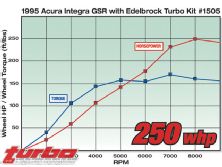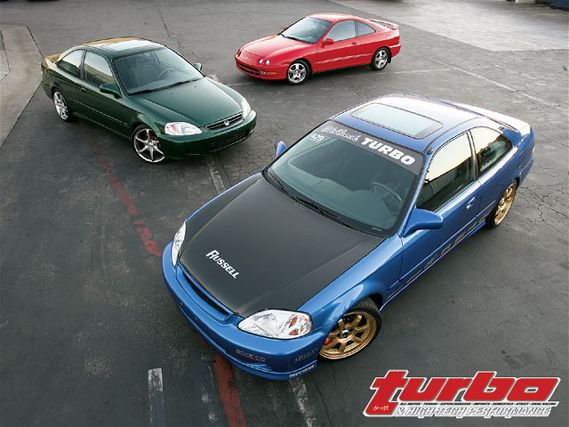 | Edelbrock Honda Turbo Kits - Carb Legal Turbo Kits
| Edelbrock Honda Turbo Kits - Carb Legal Turbo Kits
Turbocharging is old headlines for those in the Honda community. Been there, done that. These guys have been bolting boost onto Civics and Integras for nearly two decades. It began with crude turbo exhaust manifold concoctions prepared in muffler shops; turbos and intercoolers robbed from factory boost cars like junkyard Mitsubishi Eclipses and Starions; and old-time engine management solutions like boost-dependent fuel pressure regulators and timing retard boxes that worked ... sort of. These weren't turbo kits in the sense that we know of today. Far from it. The pioneers worked with what they had and pieced together what they could. It took a few years, but soon more than a few rudimentary turbo kits became available, though we hesitate today to even classify some of those as kits. If you happened to purchase a kit for, say, your B18A1 ten or so years ago, you'd walk away with some sort of cast exhaust manifold; a turbo; an intercooler; some piping that, if you're lucky, might not have to be cut to fit; a blow-off valve; and maybe a fuel pump-again, if you were lucky. Sometimes everything went where it was supposed to go. Sometimes it didn't. And since there was really nothing to tune most of the time, nothing came pre-tuned. For just over three grand you'd end up with a turbo under your hood, one or two 'Check Engine' lights, and a detonation-induced piston meltdown waiting to happen.
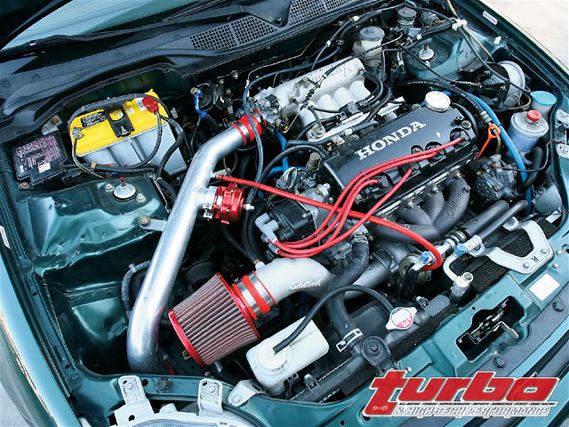 | Edelbrock Honda Turbo Kits - Carb Legal Turbo Kits
| Edelbrock Honda Turbo Kits - Carb Legal Turbo Kits
Only a few years later the number of turbo kits offered for the Integra's B-series are exponentially larger. And, the quality's improved. But with so many kits on the market, it's difficult for any one to stand out from the next. Some boast astronomical power figures more on par with a custom-built drag setup. Others brag of their kits' smog legality, drivability and reliability. The truth is, it's not that difficult to put together a turbo kit capable of making 600-plus horsepower out of a built B-series, or making a less powerful one that's emissions legal. The challenge is in the compromise. Finding an emissions-legal Honda turbo kit that doesn't achieve its greenish status at the expense of power production can be difficult.
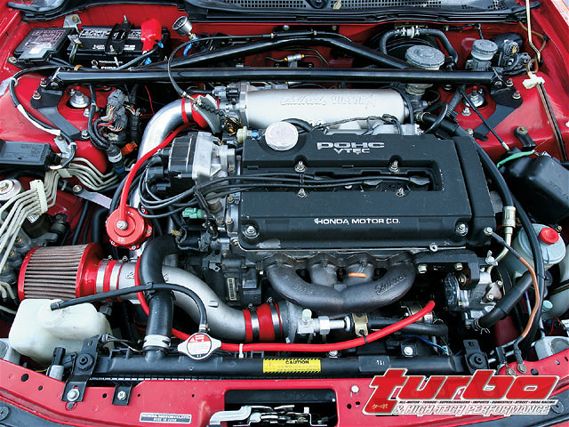 | Edelbrock Honda Turbo Kits - Carb Legal Turbo Kits
| Edelbrock Honda Turbo Kits - Carb Legal Turbo Kits
If you've ever taken an interest in anything automotive, it's likely you've heard the name Edelbrock. If you haven't, you've done a good job sheltering yourself from the world since birth. The company's been around since the late 1930s. It began by developing manifolds for flathead Ford engines and, later, almost anything and everything you can think of-including fully assembled 460hp Chevy small-block crate engines and intake manifolds for the V-8 Olds'. It's only been within the last few years that Edelbrock began developing and manufacturing parts for the sport compact industry. The latest series of such products to ship from Edelbrock's headquarters are its lineup of Honda turbocharger kits. They offer kits for the '94-'01 Integra GSR, the '99-'00 Civic Si, the '96-'00 Civic EX, and the '92-'95 Civic/Del Sol (with street and track versions of each).
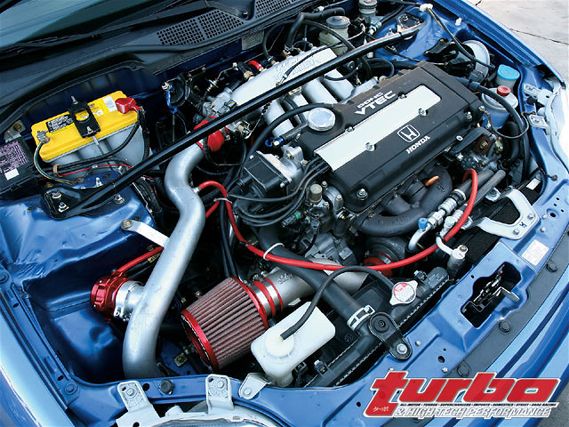 | Edelbrock Honda Turbo Kits - Carb Legal Turbo Kits
| Edelbrock Honda Turbo Kits - Carb Legal Turbo Kits
Edelbrock developed both the Performer X kit, the 50-state legal street version, and the Victor X kit, the competition-based version, for each vehicle. The main difference between the two kits is in their intake manifolds. Performer X intake manifolds feature longer runners and a smaller plenum in comparison to the Victor X. The longer runner manifolds produce peak horsepower in the 4500- to 8200-rpm zone, while the Victor X manifolds are good in the 7000- to 10,000-rpm neighborhood. Performer X kits also include a piggyback engine management system that controls ignition timing, and a secondary fuel system consisting of four added injectors. The injectors are mounted to the underside of the manifold with a supplied Edelbrock fuel rail. While Victor X kits don't come with the extra injectors or fuel rail, the provisions in the manifold are there and only need to be drilled out to house an extra set of injectors.
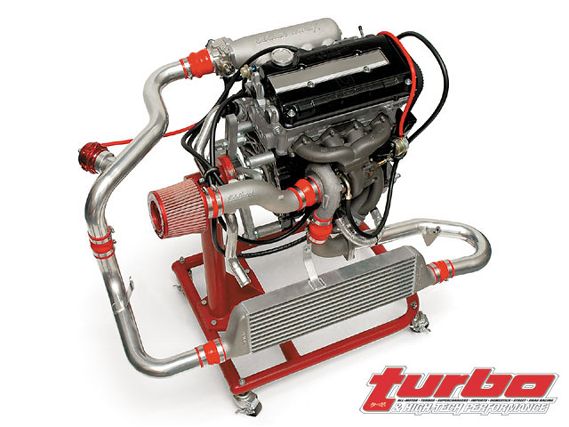 | Edelbrock Honda Turbo Kits - Carb Legal Turbo Kits
| Edelbrock Honda Turbo Kits - Carb Legal Turbo Kits
All Edelbrock Honda kits are based off of Garrett GT28-series turbochargers. The B-series kits feature the GT28RS turbo, which comes standard with a dual ball bearing center section that's both oil and water-cooled. The 62 trim compressor wheel has a 47.2mm inducer diameter and 60mm exducer diameter-fairly large, considering the GT28's somewhat medium-sized frame. The compressor housing has a .060 A/R, which is a contributor to its impressive 35-lb/min airflow rating. The GT28RS's turbine side has a 76 trim wheel and .64 A/R housing. D-series kits get the GT28R, a slightly toned-down version of the RS, which instead has a slightly smaller 60 trim wheel but equal 60 A/R on the compressor side, and a turbine side with a 62 trim wheel and .64 A/R. Both turbos are internally wastegated and are good for a maximum of around 15 to 18 psi. At boost levels like that, up to 400 hp on the engine dyno is possible on a built 1.8L with the GT28RS.
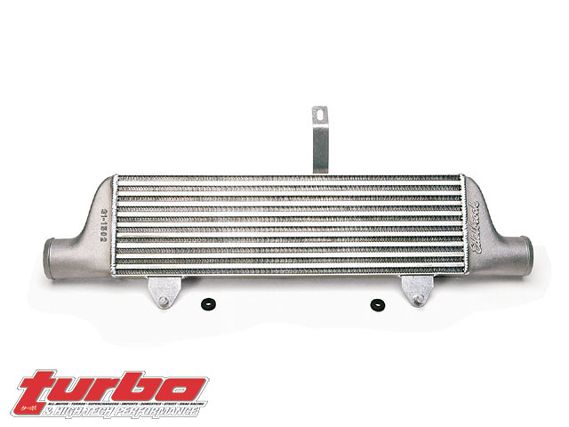 | 22-inch wide, front-mount, bar and plate intercoolers are shipped with each turbo kit. It's about the biggest size you can fit behind any of these bumpers without cutting sheetmetal. It's also more than adequate for the power produced here.
| 22-inch wide, front-mount, bar and plate intercoolers are shipped with each turbo kit. It's about the biggest size you can fit behind any of these bumpers without cutting sheetmetal. It's also more than adequate for the power produced here.
Both GT28 turbos are bolted to Edelbrock high-temperature Ni-resist cast exhaust manifolds and come preassembled with the turbo, downpipe elbow, and oil and water lines hooked up. Since the turbo comes already mounted, installers won't have to waste time orienting the compressor in the right direction for intercooler pipe lineup. You also won't have to worry about leaking coolant and oil lines on the turbo side, since those come pre-installed as well. Just be sure to hook them up to the engine properly to avoid leaks on your end. Also included in each kit is a front-mount, bar and plate-type intercooler measuring in at 22 inches wide, just the right size for slipping behind the factory bumper and with minimal cutting involved. Everything's included to make the intercooler work-like ceramic-coated piping that actually fits; clamps and couplers; and bags of hardware. It even comes with a TiAL blow-off valve, yet somehow retains its emissions-legal status.
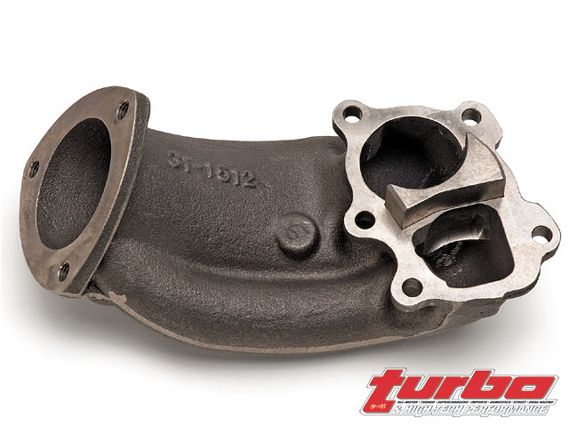 | A cast downpipe elbow is also included in the kit and bolted to the turbo out of the box. The elbow bolts right up to the Civic's or Integra's existing exhaust system and/or catalytic converter. Absolutely no trips to the muffler shop here.
| A cast downpipe elbow is also included in the kit and bolted to the turbo out of the box. The elbow bolts right up to the Civic's or Integra's existing exhaust system and/or catalytic converter. Absolutely no trips to the muffler shop here.
Like all good turbo kits, the Edelbrock kits come with a bunch of small yet important parts that are easy to overlook. These are often the kinds of things that separate a good kit from a not so good one and, in our opinion, are what makes this kit so easy to install and work so well. One of the initial problems encountered when enthusiasts first began turbocharging Hondas involves the MAP sensor. Honda ECUs throw a fit when their MAP sensors read positive pressure in the intake manifold. Solutions back in the day included one-way check valves sourced from aquariums and other crafty, two-bit tricks that bled off boost before the MAP could read it. But it was out of the question for Edelbrock to pack a set of plastic check valves in their kit, so a better plan was devised. A Split Second MAP sensor voltage clamp is provided, which alters the voltage the ECU sees from the MAP sensor under boost. This eliminates the check engine light and keeps everything happy under pressure. The kit also includes a pre-tuned Mototron piggyback ECU that controls an additional four 15-lb/hr (B-series) or 19-lb/hr (D-series) injectors and ignition timing under boost. That means that when the manifold reads vacuum, not boost, the ECU reverts back to its original engine parameters, which is one reason the kit is able to pass a smog test. Tapping into the engine block's oiling system for turbo lubrication also posed problems in the past. Top-heavy extensions of fittings and adapters were usually hung off the rear of the block and often cracked. Edelbrock supplies an oil adapter plate that bolts to the same spot on the block with fittings and lines for the turbo. The kits also include offset woodruff keys for repositioning camshaft timing. Instead of adjustable camshaft gears, the keys put camshaft timing in the exact location that Edelbrock has realized the most power with, so that, like the Mototron, there's absolutely no tuning involved.
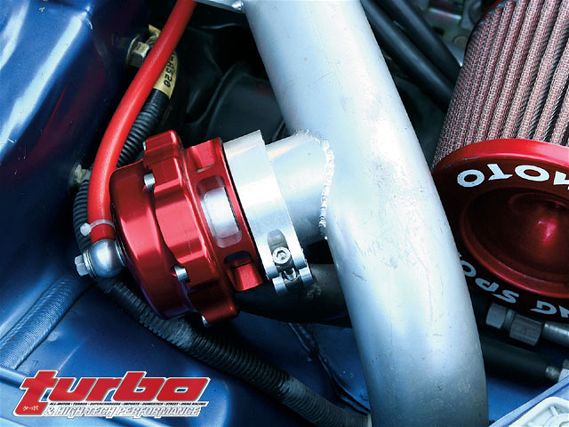 | A TiAL blow-off valve attaches to the ceramic-coated intercooler piping specifically designed for, and supplied with, each kit.
| A TiAL blow-off valve attaches to the ceramic-coated intercooler piping specifically designed for, and supplied with, each kit.
And the Edelbrock kits fit. This may sound like a given, but we've seen more than a few turbo kits over the years that don't fit-at least not very well. The fact that they fit cuts hours off of installation time. The last Edelbrock kit we installed took one day. And, we didn't have to run to the parts store once. Exhaust manifolds and external wastegates that rub holes in AC lines, crossmembers that require notches lopped in them for downpipe clearance, oil dipsticks that will never come out again-these were common issues in the past, but all resolved by Edelbrock. The only trimming we've seen on the Edelbrock kits is for intercooler clearance; and that's just minor plastic cutting and is all behind the scenes stuff you'll never notice. Everything fits without removing the vehicles' AC, power steering or cruise control. It all stays.
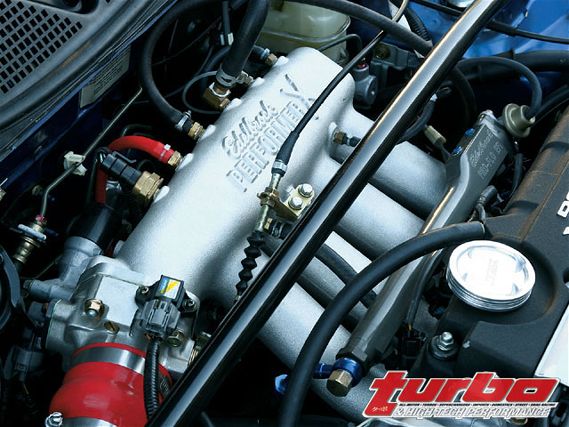 | Both the Performer X and Victor X intake manifolds have threaded bosses along the backs of their plenums for the Mototron MAP sensor as well as vacuum fittings for the brake booster and fuel pressure regulator. No drilling or tapping required and all of the fittings are supplied.
| Both the Performer X and Victor X intake manifolds have threaded bosses along the backs of their plenums for the Mototron MAP sensor as well as vacuum fittings for the brake booster and fuel pressure regulator. No drilling or tapping required and all of the fittings are supplied.
As expected, all three kits perform differently since vehicle weights and base horsepower figures vary. Naturally, the Edelbrock-equipped Civic Si and Integra GSR are more powerful and faster than the Civic EX. With nothing more than the turbo kit bolted on, the GSR breaks the 250hp barrier on the chassis dyno without a sweat; while the Civic EX posted a maximum of 283 hp on the engine dyno. Civic Si kits predictably fall in between, at 220 hp on the chassis dyno. The Si uses virtually the same kit as the GSR, but lacks in the displacement department. Since installing the kit on Turbo's Project Integra we've had an opportunity to put quite a few trouble-free miles on the B18C1. The GSR is fun to drive and has the ultimate street-car torque curve now, making almost 160 lb-ft at 7000 rpm; with most of it coming on at a reasonably early 4000 rpm, which is only halfway through the tach. We also had the opportunity to drive Edelbrock's own turbocharged Civic EX. Of course, after already experiencing the GSR for a few months, getting behind the seat of the EX wasn't as impressive. But, to be fair, the next time we got behind the wheel of a stock EX we definitely felt what was missing. The smaller Civic engine predictably takes a bit longer to build torque when compared to the B-series, and doesn't really begin to hit high spots on the dyno chart until about 5000 rpm. But the horsepower curve is pleasantly smooth and linear, which is one thing we noticed when we stabbed the EX's throttle and held it down into near triple-digit miles-per-hour territory. The EX is quick, but don't expect to break the tires loose on the freeway.
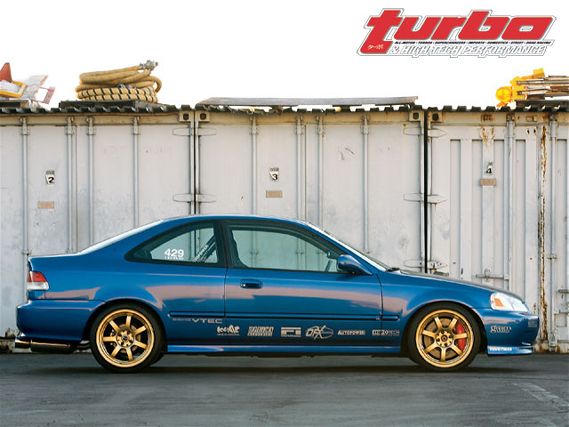 | Edelbrock Honda Turbo Kits - Carb Legal Turbo Kits
| Edelbrock Honda Turbo Kits - Carb Legal Turbo Kits
A Honda enthusiast's biggest problem when searching for a turbo kit today won't be finding one, but rather sorting through the dozens available to find the one that does what you want. Kits can be broken down into categories such as: how much power they make; whether or not they're street legal; how complete they are; and how well they fit. Some kits fill some of these categories better than others. Others touch on each, never really excelling at any one in particular. We come across more than a few kits here at Turbo. We see the big-power, expensive, soccer-ball-sized-compressor Honda kits, which produce gobs of illegal, expensive horsepower-as well as the cheaper, entry-level kits more reminiscent of something that was put together a couple of decades ago. Edelbrock's kits are neither. The horsepower is usable and is the core of a true street-legal vehicle that can run on pump gasoline and pass a smog check.
We've come a long way from the muffler shop, junkyard parts concoctions of yesterday.

